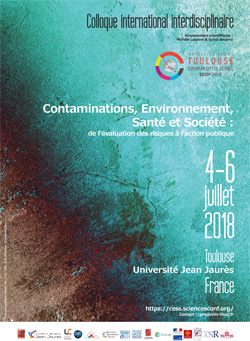- Colloque « Contaminations, environnement, santé et société : de l’évaluation des risques à l’action publique » 4-6 juillet 2018
- Les chercheur.e.s communicant.e.s aux Sessions parallèles :
Danielle Cornot sur le thème » Wine and global change: the challenge of economic globalization » et « Wine and global change: new wine cultures »
Anne Dupuy sur le thème » The role of French food model in the regulation of appetite of children aged between 0 and 3 years »
Vincent Simoulin sur le thème « Are policies of « excellence » excellent for the careers and for scientific activity? »
En savoir plus ci-après

Les contaminations environnementales sont partout. Leurs effets délétères sur la santé mais aussi sur le bien-être social et le développement durable des populations sont régulièrement dénoncés du niveau local au niveau international depuis des décennies (West et al. 2016 ; Boudia et Jas, 2015 ; San Sebastian, 2000 ; Kimerling, 1991 ; Carson 1962). Les conséquences incertaines de leur accumulation (effet cocktail) lors d’expositions indésirables recèlent un potentiel conflictuel et sanitaire générateur d’inquiétudes.
Ce colloque international est centré sur l’analyse des contaminations environnementales tant du point de vue de leur évaluation scientifique (notamment interdisciplinaire) que de leur prise en charge politique ou sociale.
Co-organisé par : CERTOP (UMR5044 CNRS) et GET (UMR5563 CNRS)
Michèle Lalanne-Lestieu, sociologue, professeure des universités, INU Champollion Albi, CERTOP et Sylvia Becerra, sociologue, chargée de recherche CNRS, GET
Avec Paolo Crivellari (sociologue, MCF, UT3), Camille Dumat (Professeure en sciences du sol, ENSAT-INP) et Guilhem Juteau-Martineau (doctorant en sociologie) du CERTOP, membres du Comité scientifique.
Website : https://cess.sciencesconf.org
Cette manifestation est labellisée « manifestation satellite » d’ESOF 2018.
- Participation de Danielle Cornot au Programme scientifique d’ESOF – Sessions parallèles 13 juillet 2018
Danielle Cornot est maîtresse de conférence à l’UT2J et membre du CERTOP. Ses recherches portent sur la socio-anthropologie du vin. Elle est co-fondatrice du groupe de recherche « In Vino Varietas » et co-auteure de l’ouvrage « Les arts et métiers de la vigne et du vin. Révolution des savoirs et des savoir-faire. » paru en 2016.
13 juillet – 15h15 « Wine and global change: the challenge of economic globalization »
Since the late 1970s, international trade has expanded at an unprecedented rate, leading to the term, the « Second Globalization » (e.g. Aglietta and Le Cacheux, 2007). New wine producing countries have emerged in the so-called « New World » and then in the Asian continent, especially China (Giroir, 2015), while in the European producing countries, the consumption of wine has declined steadily (OIV, 2015). Today, paradoxically in a context of increasing globalization, international wine trade seems to be stabilizing. In this workshop, we will organize a debate based on two short presentations. On the one hand, we will review the most recent trends. On the other hand, we will discuss the impact of global changes on stakeholders and analyze two hypotheses:
– the possible need for increasingly diversified strategies.
– a possible recomposition of the convergences and divergences between the different categories of stakeholders.
If the first hypothesis is confirmed, another question will be raised: is this diversification of strategies due to a different perception/representation of global changes? or is it only due to the particular profiles and professional trajectories of the stakeholders? If the second hypothesis holds, it will be necessary to identify the new balances that will emerge between individual strategies, small collectives (small groups of independent wine growers, for example) and collectives (cooperative cellars, for example).
Submitted by Danielle CORNOT – CERTOP
Speakers: Eric ROUVELLAC – Université de Limoges, UMR CNRS 6042 GEOLAB, Danielle CORNOT – Université Toulouse – Jean Jaurès, Peter HAYES – International Organization of Vine and Wine (OIV), Charles Sturt University, Valerie OLIVIER – INP ENSAT – IN VINO VARIETAS- UMR (INP-INRA) 1248 AGIR-ODYCEE, associé à Dynamiques rurales (UMR LISST), Michaël POUZENC – Université Toulouse Jean Jaurès
13 juillet – 17h « Wine and global change: new wine cultures »
Across the globe, wine culture is undergoing a profound change for consumers, a change that could be summarized as « less but better ». The new wine culture, led in particular by the « New World » producers, also targets the supposed hedonism of contemporary consumers by accentuating the sensory characteristics of world-renowned grape varieties, technologically crafted to obtain an amplification of the levels of aromas, tannins and other anthocyanins (Morel-Salmi et al., 2006). France is more exposed to this evolution than all the other producing countries of the « Old Continent » because of an image of elitist wines grounded in tradition, conveyed by the world fame of the great wines of Burgundy and Bordeaux. The interaction between culture and economy, which concerns the entire European wine-growing regions, will be addressed. In this prospective study, we will review the actions taken by the various stakeholders in the wine sector in order to respond to the changing and diverse demand of consumers worldwide, focusing on successes and failures and their determinants. We will analyze more closely the tension between the growing consumer demand for naturalness » (organic, natural, biodynamic wines …) (G. Teil et al., 2011) worldwide and the promotion of technological wines first promoted by the competition of the countries of the so-called « New World » imposing a certain standardization of the typicity of the wines. In addition, we will be interested in the concepts of « Heritage, Innovation, and Métissage » by considering the articulation between continuity/inheritance and change/innovation, in the representations and practices of the stakeholders.
Submitted by Michaël POUZENC – LISST
Speakers: William BEEZLEY – University of Arizona, Danielle CORNOT – Université Toulouse – Jean Jaurès, Nadia FORTE – Université Toulouse 2 – Jean Jaurès, Eric ROUVELLAC – Université de Limoges, UMR CNRS 6042 GEOLAB, Michaël POUZENC – LISST University of Toulouse
- Participation de Anne Dupuy au Programme scientifique d’ESOF – Flash presentations 14 juillet 2018, 10h & Posters
Anne Dupuy est maîtresse de conférences en sociologie à l’UT2J (ISHTIA) et membre du CERTOP.
Cette présentation s’inscrit dans le cadre du projet ANR PUNCH « Promoting and UNderstanding healthy food choices in CHildren« coordonné par Sophie Nicklaus (INRA, UMR CSGA). Anne Dupuy est responsable du Task « Impact of socialization on capacity to control energy intake », et travaille en collaboration avec Laurence Tibère, maîtresse de conférences en sociologie à l’UT2J (ISHTIA), également membre du CERTOP.
« The role of French food model in the regulation of appetite of children aged between 0 and 3 years », Anne Dupuy and Laurence Tibère
The scientific aims of this poster are to describe the food socialization process of children up to 3 years, notably some determinants of « what » and « how much » is eaten in infants by taking into account sociological factors. Social conditions of the regulation of appetite were still insufficiently documented, whereas risk of obesity is not evenly distributed among social classes. Little has been done on children aged 0-3 years with the exception of work on the social determinants of breastfeeding (Gojard, 2000, 2012; Kersuzan et al. 2014) and the process of co-socialization in food in 0-3 year-old children (Dupuy & Rochedy, 2015). We present how parents & caregivers, in a process of co-education, manage milk consumption and then, solid food intakes. Methodology: conducting sociologic interviews who will involve 28 parents (24 interviewed twice; 209 photos of meals & food waste have been collected) and 25 caregivers (127 photos of meals collected). This comprehensive methodology offers the possibility to account for the social determinants & contexts in which the cognitive & physiological processes of appetite control take place. Socio-descriptive variables will be considered for the parent (level of education & graduates; matrimonial & familial status; SES & sociocultural positions; types of childcare & medical follow-up; scheduled professional activities) & caregivers (level of education & graduates; matrimonial & familial status; SES & sociocultural positions; types of contracts).Results: parts of results show how food models (Poulain, 2002) in particular daily food intakes temporalities (incrementation of social rhythms on biological rhythms serve as temporal markers fixing the appetite), transmission of a meal structure takes part in children’s ability to control their appetite; finally the regulation of the appetite by learning table manners. We consider results regarding to the baby gender & comparison with SES’parents & SES’S caregivers.
- Participation de Vincent Simoulin au Programme scientifique d’ESOF – Sessions parallèles 10 juillet 2018, 17h
Vincent Simoulin est professeur des universités en sociologie à l’UT2J et membre du CERTOP. Ses recherches ont trait à l’ action publique, la sociologie des sciences, le changement organisationnel, la gouvernance territoriale. Il est l’auteur de « Sociologie d’un grand équipement scientifique : le premier synchrotron de troisième génération. » paru en 2012.
« Are policies of « excellence » excellent for the careers and for scientific activity? »
For at least 10 years research policies have tended to focus on « excellence » in most OEDC and European Countries and favored the implementation of devices like Labex (laboratories of excellence) or Equipex (Equipment of excellence) in France, Excellenz Initiativ in Germany, etc. What can be said about the effects on careers of these policies in a few years? Do they favor already heavily funded researchers to the detriment of others (according to the Mathew effect) or do they create communities in which everyone can perform « excellent » activities? Are they pushing creativity or do researchers fear so much for their careers that they imitate the leaders and heavy names of their field? In this session, researchers will endeavor to address this issues from experiences in a variety of countries.
Submitted by Vincent SIMOULIN – CERTOP
Speakers:
Alberto BACCINI – University of Siena, Cecile CRESPY – Sciences Po Toulouse, Vincent SIMOULIN – CERTOP, Teele TÕNISMANN – LaSSP, Jerome VICENTE – UFTMIP, Luke GEORGHIOU – The University of Manchester, Yves GINGRAS – Université du Québec à Montréal
ESOF – EuroScience Open Forum, 9-14 juillet 2018 – Toulouse

Illustrant le succès d’une dynamique collective, Toulouse a été choisie pour accueillir la 8e édition d’ESOF (EuroScience Open Forum), la plus grande rencontre interdisciplinaire sur la science et l’innovation en Europe, en juillet 2018. EuroScience et le ministère de l’Éducation nationale, de l’Enseignement supérieur et de la Recherche l’ont annoncé le 1er décembre 2014 : Toulouse décroche ainsi le label de « Cité européenne de la Science » pour l’année 2018 et permet à la France d’organiser ce forum pour la première fois.
Retrouvez ici toutes les manifestations ESOF dont le CNRS est partenaire
Lire le communiqué de presse national « Le CNRS investit ESOF 2018 »







